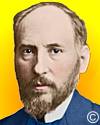 (source)
(source)
|
Santiago Ramón y Cajal
(1 May 1852 - 18 Oct 1934)
Spanish histologist who was awarded a Nobel Prize for his studies of the retina.
|
Science Quotes by Santiago Ramón y Cajal (24 quotes)
>> Click for Santiago Ramón y Cajal Quotes on | Intellect | Life | Pain |
>> Click for Santiago Ramón y Cajal Quotes on | Intellect | Life | Pain |
As long as our brain is a mystery, the universe, the reflection of the structure of the brain will also be a mystery.
— Santiago Ramón y Cajal
In Charlas de Café: pensamientos, anécdotas y confidencias (1920,1967), 276. (Café Chats: Thoughts, Anecdotes and Confidences). As translated in Roger Carpenter and Benjamin Redd, Neurophysiology: A Conceptual Approach (2012), 5th ed., 16. From the original Spanish, “Mientras nuestro cerebro sea un arcano, el universo reflejo de su estructura también será un misterio.”
Buffon said unreservedly, "Genius is simply patience carried to the extreme." To those who asked how he achieved fame he replied: "By spending forty years of my life bent over my writing desk.”
— Santiago Ramón y Cajal
From Reglas y Consejos sobre Investigacíon Cientifica: Los tónicos de la voluntad. (1897), as translated by Neely and Larry W. Swanson, in Advice for a Young Investigator (1999), 39.
Genius, like the inhabitants of the depths of the sea, moves by its own light.
— Santiago Ramón y Cajal
…...
Heroes and scholars represent the opposite extremes... The scholar struggles for the benefit of all humanity, sometimes to reduce physical effort, sometimes to reduce pain, and sometimes to postpone death, or at least render it more bearable. In contrast, the patriot sacrifices a rather substantial part of humanity for the sake of his own prestige. His statue is always erected on a pedestal of ruins and corpses... In contrast, all humanity crowns a scholar, love forms the pedestal of his statues, and his triumphs defy the desecration of time and the judgment of history.
— Santiago Ramón y Cajal
From Reglas y Consejos sobre Investigacíon Cientifica: Los tónicos de la voluntad. (1897), as translated by Neely and Larry W. Swanson, in Advice for a Young Investigator (1999) 41-42.
I would be the last to deny that the greatest scientific pioneers belonged to an aristocracy of the spirit and were exceptionally intelligent, something that we as modest investigators will never attain, no matter how much we exert ourselves. Nevertheless … I continue to believe that there is always room for anyone with average intelligence … to utilize his energy and … any man could, if he were so inclined, be the sculptor of his own brain, and that even the least gifted may, like the poorest land that has been well-cultivated and fertilized, produce an abundant harvest..
— Santiago Ramón y Cajal
From Preface to the second edition, Reglas y Consejos sobre Investigacíon Cientifica: Los tónicos de la voluntad. (1897), as translated by Neely and Larry W. Swanson, in Advice for a Young Investigator (1999), xv.
If a photographic plate under the center of a lens focused on the heavens is exposed for hours, it comes to reveal stars so far away that even the most powerful telescopes fail to reveal them to the naked eye. In a similar way, time and concentration allow the intellect to perceive a ray of light in the darkness of the most complex problem.
— Santiago Ramón y Cajal
From Reglas y Consejos sobre Investigacíon Cientifica: Los tónicos de la voluntad. (1897), as translated by Neely and Larry W. Swanson, in Advice for a Young Investigator (1999), 34.
If a solution fails to appear … and yet we feel success is just around the corner, try resting for a while. … Like the early morning frost, this intellectual refreshment withers the parasitic and nasty vegetation that smothers the good seed. Bursting forth at last is the flower of truth.
— Santiago Ramón y Cajal
From Reglas y Consejos sobre Investigacíon Cientifica: Los tónicos de la voluntad. (1897), as translated by Neely and Larry W. Swanson, in Advice for a Young Investigator (1999), 35.
In my own view, some advice about what should be known, about what technical education should be acquired, about the intense motivation needed to succeed, and about the carelessness and inclination toward bias that must be avoided is far more useful than all the rules and warnings of theoretical logic.
— Santiago Ramón y Cajal
From Reglas y Consejos sobre Investigacíon Cientifica: Los tónicos de la voluntad. (1897), as translated by Neely and Larry W. Swanson, in Advice for a Young Investigator (1999), 6.
In summary, all great work is the fruit of patience and perseverance, combined with tenacious concentration on a subject over a period of months or years.
— Santiago Ramón y Cajal
From Reglas y Consejos sobre Investigacíon Cientifica: Los tónicos de la voluntad. (1897), as translated by Neely and Larry W. Swanson, in Advice for a Young Investigator (1999), 38.
In the study of this membrane [the retina] I for the first time felt my faith in Darwinism (hypothesis of natural selection) weakened, being amazed and confounded by the supreme constructive ingenuity revealed not only in the retina and in the dioptric apparatus of the vertebrates but even in the meanest insect eye. ... I felt more profoundly than in any other subject of study the shuddering sensation of the unfathomable mystery of life.
— Santiago Ramón y Cajal
Recollections of My Life (1898), 576. Quoted in Sidney Perkowitz, Empire of Light (1999), 16.
Intellectual beauty is sufficient unto itself, and only for it rather than for the future good of humanity does the scholar condemn himself to arduous and painful labors.
— Santiago Ramón y Cajal
From Reglas y Consejos sobre Investigacíon Cientifica: Los tónicos de la voluntad. (1897), as translated by Neely and Larry W. Swanson, in Advice for a Young Investigator (1999), 51.
Intellectual work is an act of creation. It is as if the mental image that is studied over a period of time were to sprout appendages like an ameba—outgrowths that extend in all directions while avoiding one obstacle after another—before interdigitating with related ideas.
— Santiago Ramón y Cajal
From Reglas y Consejos sobre Investigacíon Cientifica: Los tónicos de la voluntad. (1897), as translated by Neely and Larry W. Swanson, in Advice for a Young Investigator (1999), 34.
It is best to attenuate the virulence of our adversaries with the chloroform of courtesy and flattery, much as bacteriologists disarm a pathogen by converting it into a vaccine.
— Santiago Ramón y Cajal
In Charlas de Café: pensamientos, anécdotas y confidencias (1920, 1967), 32. (Café Chats: Thoughts, Anecdotes and Confidences). As translated in Peter McDonald (ed.) Oxford Dictionary of Medical Quotations (2004), 83. From the original Spanish, “Cuando no se ha nacido rico y es fuerza, por tanto, luchar por la existencia, la más hábil y piadosa conducta consiste en adormecer y atenuar la toxicidad de nuestros émulos y adversarios con el cloroformo de la cortesía y del halago. Procedamos como el bacteriólogo que, en la imposibilidad de aniquilar al microbio, opta por embolarlo, es decir, por convertirlo en saludable vacuna.” A more literal translation attempted by Webmaster using Google Translate is “When you are not born rich and mighty, thus, struggle for existence, the most shrewd and pious behavior is to calm and reduce the toxicity of our rivals and adversaries with the chloroform of politeness and flattery. Proceed as the bacteriologist who, unable to kill the microbe, opt for embolization (?), ie, by converting it into a healthy vaccine.”
It is idle to dispute with old men. Their opinions, like their cranial sutures, are ossified.
— Santiago Ramón y Cajal
In Charlas de Café as cited in Peter McDonald (ed.) Oxford Dictionary of Medical Quotations (2004), 83.
It is notorious that the desire to live increases as life itself shortens.
— Santiago Ramón y Cajal
In Charlas de Café: pensamientos, anécdotas y confidencias (1920). (Café Chats: Thoughts, Anecdotes and Confidences). As translated in Peter McDonald (ed.) Oxford Dictionary of Medical Quotations (2004), 83.
Like an earthquake, true senility announces itself by trembling and stammering.
— Santiago Ramón y Cajal
In Charlas de Café: pensamientos, anécdotas y confidencias (1920, 1967), 95. (Café Chats: Thoughts, Anecdotes and Confidences). As (loosely) translated in Peter McDonald (ed.) Oxford Dictionary of Medical Quotations (2004), 83. From the original Spanish, “La verdadera, la aterradora, la inexorable senilidad comienza en la fase de temblor y balbuceo, es decir, cuando el cerebro está salpicado de placas seniles y entendimiento y carácter retroceden al estado infantil. A semejanza del edificio cuarteado por el terremoto, la citada agitación anuncia ruina inminente.”
A more complete translation attempted by Webmaster with Google Translate is: “True, the terrifying, the inexorable senility begins at the stage of tremor and slurred speech, i.e. when the brain is dotted with senile plaques, and understanding and character regress to the infantile state. Like the building cracked by the earthquake, said agitation announces impending doom.”
Nothing inspires more reverence and awe in me than an old man who knows how to change his mind.
— Santiago Ramón y Cajal
In Pensamientos Escogidos (1924), 58. Translated from the original Spanish, “Nada me inspira más veneración y asombro que un anciano que sabe cambiar de opinión.”
Our novice runs the risk of failure without additional traits: a strong inclination toward originality, a taste for research, and a desire to experience the incomparable gratification associated with the act of discovery itself.
— Santiago Ramón y Cajal
From Reglas y Consejos sobre Investigacíon Cientifica: Los tónicos de la voluntad. (1897), as translated by Neely and Larry W. Swanson, in Advice for a Young Investigator (1999), 48.
Physical pain is easily forgotten, but a moral chagrin lasts indefinitely.
— Santiago Ramón y Cajal
In Charlas de Café: pensamientos, anécdotas y confidencias (1920). (Café Chats: Thoughts, Anecdotes and Confidences). As translated in Peter McDonald (ed.) Oxford Dictionary of Medical Quotations (2004), 83.
That which enters the mind through reason can be corrected. That which is admitted through faith, hardly ever.
— Santiago Ramón y Cajal
In Charlas de Café: pensamientos, anécdotas y confidencias (1920). (Café Chats: Thoughts, Anecdotes and Confidences). As translated in Peter McDonald (ed.) Oxford Dictionary of Medical Quotations (2004), 83.
The history of civilization proves beyond doubt just how sterile the repeated attempts of metaphysics to guess at nature’s laws have been. Instead, there is every reason to believe that when the human intellect ignores reality and concentrates within, it can no longer explain the simplest inner workings of life’s machinery or of the world around us.
— Santiago Ramón y Cajal
From Reglas y Consejos sobre Investigacíon Cientifica: Los tónicos de la voluntad. (1897), as translated by Neely and Larry W. Swanson, in Advice for a Young Investigator (1999), 2.
The indescribable pleasure—which pales the rest of life's joys—is abundant compensation for the investigator who endures the painful and persevering analytical work that precedes the appearance of the new truth, like the pain of childbirth. It is true to say that nothing for the scientific scholar is comparable to the things that he has discovered. Indeed, it would be difficult to find an investigator willing to exchange the paternity of a scientific conquest for all the gold on earth. And if there are some who look to science as a way of acquiring gold instead of applause from the learned, and the personal satisfaction associated with the very act of discovery, they have chosen the wrong profession.
— Santiago Ramón y Cajal
From Reglas y Consejos sobre Investigacíon Cientifica: Los tónicos de la voluntad. (1897), as translated by Neely and Larry W. Swanson, in Advice for a Young Investigator (1999), 50.
There are no small problems. Problems that appear small are large problems that are not understood
— Santiago Ramón y Cajal
From Reglas y Consejos sobre Investigacíon Cientifica: Los tónicos de la voluntad. (1897), as translated by Neely and Larry W. Swanson, in Advice for a Young Investigator (1999), 17.
To bring scientific investigation to a happy end once appropriate methods have been determined, we must hold firmly in mind the goal of the project. The object here is to focus the train of thought on more and more complex and accurate associations between images based on observation and ideas slumbering in the unconscious.
— Santiago Ramón y Cajal
From Reglas y Consejos sobre Investigacíon Cientifica: Los tónicos de la voluntad. (1897), as translated by Neely and Larry W. Swanson, in Advice for a Young Investigator (1999), 33.
See also:
- 1 May - short biography, births, deaths and events on date of Cajal's birth.
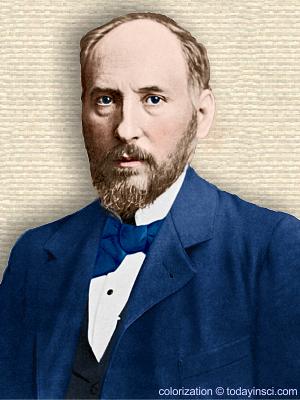
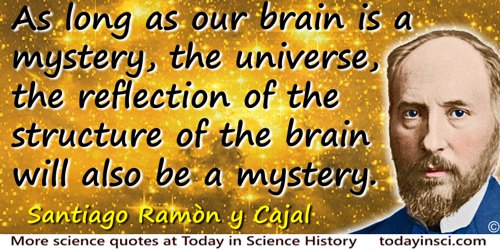
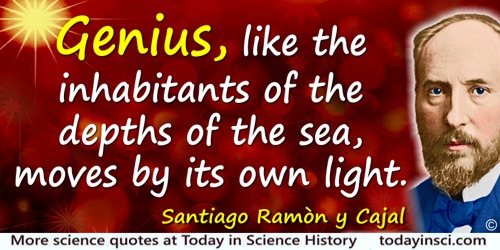
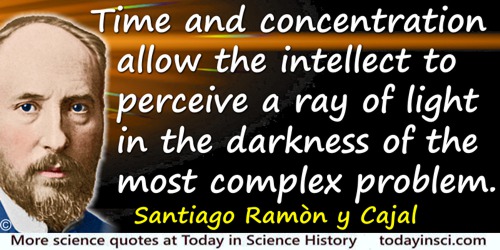
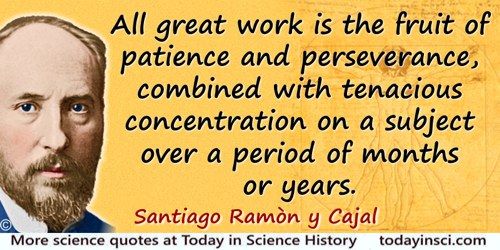
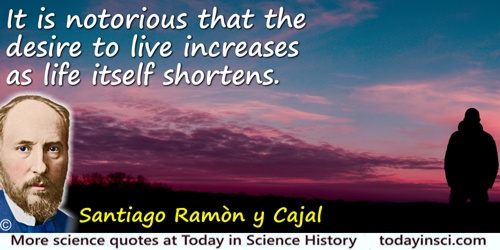
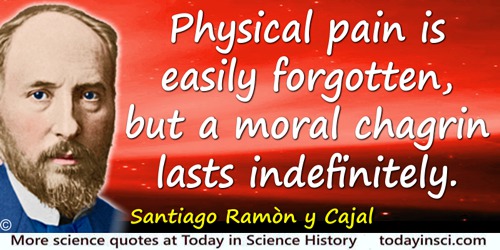
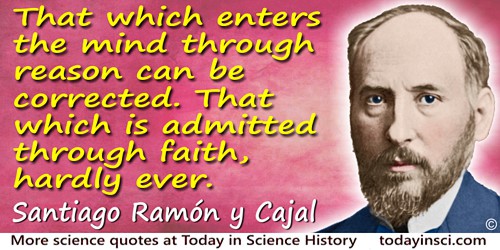
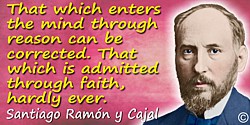
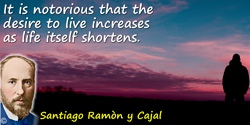
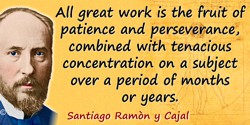
 In science it often happens that scientists say, 'You know that's a really good argument; my position is mistaken,' and then they would actually change their minds and you never hear that old view from them again. They really do it. It doesn't happen as often as it should, because scientists are human and change is sometimes painful. But it happens every day. I cannot recall the last time something like that happened in politics or religion.
(1987) --
In science it often happens that scientists say, 'You know that's a really good argument; my position is mistaken,' and then they would actually change their minds and you never hear that old view from them again. They really do it. It doesn't happen as often as it should, because scientists are human and change is sometimes painful. But it happens every day. I cannot recall the last time something like that happened in politics or religion.
(1987) -- 


